Boulez: Piano Sonata No. 2 [plys Berg, Milhaud] – Claude Helffer (DG)
“Crystal Sky” – Julie Lyon with Jack DeSalvo, Chris Forbes, Larry Hutter, Tom Cabrera (Unseen Rain, via BandCamp)
Weinberg: Quartets Nos. 1, 7 & 8 – Arcadia Qt (Chandos)
Crahms: Symphonies Nos. 3 & 4 arranged for piano four-hands – Matthies & Cohn (Naxos)
“The Mistress” [Abraham Cowley’s Poems Set by Blow, Purcell & Others] – The Consort of Musicke (Columns)
“Donaueschiger Musiktage 1990” (col legno)
“Black Myth” – San Ra and His Intergalactic Research Orchestra (MPS)
Cardew: The Great Learning – Scratch Orchestra (DG avant garde)
Category Archives: Blog
This section contains news, updates and oress releases about our company.
Weekly playlist for February 3
Busoni: Violin Sonata No. 2 – Joseph Szigeti, Clara Haskil (Music & Arts)


 Schoenberg: Piano Music – Paul Jacobs (Nonesuch)
Schoenberg: Piano Music – Paul Jacobs (Nonesuch)
“Bedtime for Democracy” – Dead Kennedys (Alternative Tentacles)
Bach & Vivaldi: Violin Concertos – David Oistrakh, Isaac Stern, Eugene Ormandy, The Philadelphia Orchestra (Columbia)
Amy: L’Espace du souffle – Jean Deroyer, Monte Carlo Philharmonic Orchestra (OPMC)
“Space-Age Bachelor Pad Music” – Esquivel (RCA)
L. Andriessen, R. Escher, Rijnvos “D utch Twentieth Century Premieres at the Holland Festival” (Globe)
utch Twentieth Century Premieres at the Holland Festival” (Globe)
“A Russell Oberlin Recital” (Decca US, reissued on DG)
Weekly playlist for January 13 (a day late)
Berlioz: La damnation de Faust – Margiano, Quasthoff, Cole, Haitink, Netherlands RPO (Challenge)
“Chewing Hides the Sound” – Snakefinger (Ralph)
 Hindemith: Pittsburgh Symphony – Kegel, Berlin Symphony (Berlin)
Hindemith: Pittsburgh Symphony – Kegel, Berlin Symphony (Berlin)
Rossini: Semiramide – Studer, Ramey, Marin, LSO (DG)
“The Countryside is Great” – Emerson Kitamaru (EM Records)
Jolivet: Suite Française – Jolivet, ens (EMI)
Koenig, Pongrácz, Riehm: Electronic Music (DG avant garde)
“Ricci Plays Sarasate” (Decca US)
Michael Rabin “at the height of his powers”
Remastered by Urlicht AudioVisual’s Gene Gaudette – strong critical praise shared with Parnassus Records’ Leslie Gerber:
 “Last September I included in this column Parnassus’s ‘Michael Rabin on The Bell Telephone Hour’, promising a forthcoming second volume, which has now appeared and like the first includes some dazzling tracks. Both volumes are mandatory purchases for violin buffs. But more important still for fans… is a coupling of two full-length concertos that he never had the chance to take into the studio, Paul Creston’s Second (which Rabin commissioned) and, most treasurable, the Beethoven Concerto. … Both recordings only go to illustrate Rabin’s level of musical and technical superiority while at the height of his powers. Gene Gaudette’s remastering is excellent and so are Leslie Gerber’s notes.”
“Last September I included in this column Parnassus’s ‘Michael Rabin on The Bell Telephone Hour’, promising a forthcoming second volume, which has now appeared and like the first includes some dazzling tracks. Both volumes are mandatory purchases for violin buffs. But more important still for fans… is a coupling of two full-length concertos that he never had the chance to take into the studio, Paul Creston’s Second (which Rabin commissioned) and, most treasurable, the Beethoven Concerto. … Both recordings only go to illustrate Rabin’s level of musical and technical superiority while at the height of his powers. Gene Gaudette’s remastering is excellent and so are Leslie Gerber’s notes.”
– Rob Cowan, Gramophone
Read the full review here.
Playlist for the week of Dec. 9. 2024
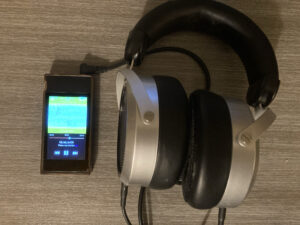 Wagner: Rienzi – Studer, Kollo, Sawallisch (Orfeo)
Wagner: Rienzi – Studer, Kollo, Sawallisch (Orfeo)
Scelsi: Bot-Ba – Marianne Schröder (hat ART)
Bertoia: Swinging Bars & Vulcans Play – Bertoia (Somnmbient)
Piston: Symphony No. 4, Schuman: Symphony No. 6 – Ormandy, Philadelphia Orchestra (Columbia)
“Today and Now” – Coleman Hawkins Quartet (Impulse!)
“Red Exposure” – Chrome (Dossier)
Fitzwilliam Virginal Book, Volume 7 – Belder (Brilliant)
Respighi: Lauda per la Natività del Signore – von Otter, Ely, Mikaela Choir (Proprius)
Playlist for the week of Nov. 24, 2024
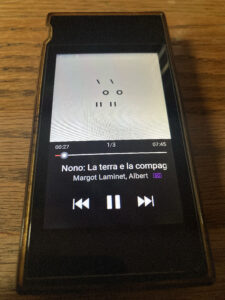 “English Music for Strings” – Collins, New Symphony Orchestra (Decca)
“English Music for Strings” – Collins, New Symphony Orchestra (Decca)
“Glass World of Annea Lockwood” (Room40, digital reissue)
Elgar: Violin Concerto – Frang (Warner)
“Beat” – King Crimson (EG)
Nono: Seguente (edition RZ)
Monk: Atlas (ECM)
Poulenc: Aubade, Les Biches (Tacchino, Prêtre) – EMI
“Liberation Music Orchestra” – Chalie Haden (Impulse!)
Johann Michael Bach, Johann Christoph Bach: Choral and Keyboard Works (Ricercar, from the “Masters of the German Baroque” big box)
#classicalmusic
#weekly #classical #playlist for 15 July 2024
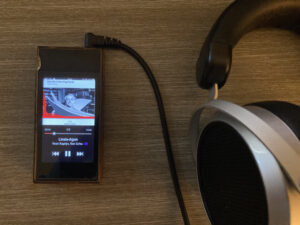 Schoenberg: Serenade Op. 24, Variations Op. 31, Bach Transcriptions – Robert Craft, 20th Century Chamber Ensemble, Philharmonia Orchestra (Naxos)
Schoenberg: Serenade Op. 24, Variations Op. 31, Bach Transcriptions – Robert Craft, 20th Century Chamber Ensemble, Philharmonia Orchestra (Naxos)
Qobuz • Apple Music • Amazon
‘Masters of Chopin’ – Ignaz Friedman, Ignace Tigerman, Severin Eisenberger (arbiter)
Apple Music
Telemann: ‘The Grand Concertos for Mixed Instruments, Volume 2’ – Michael Schneider, La Stagione Frankfurt (cpo)
Qobuz • Apple Music • Amazon
‘God’s Favorite Dog’ (Touch and Go, ripped and restored from vinyl!)
Louis Andriessen: Il Principe, Il Duce (Donemus Composers’ Voice, ripped and restored from vinyl!)
‘Xenakis in het Orgelpark’ (Orgelparkrecords)
Qobuz • Apple Music • Amazon
[partial and late] Playlist for the week:
In answer to several inquiries…
UPDATE, 24 October 2024 – some additions.
For reasons unknown, several people have recently asked me about favorite conductors/recordings/performers/miscellany. As an individual approaching official “senior” age and nearly half a century of serious listening, record collecting, and now occasional music-making, I am taking the liberty of naming several favorites in each category, in reverse alphabetical order.
COMPOSERS:
Iannis Xenakis • Richard Wagner • Giacinto Scelsi • Gustav Mahler • György Ligeti • Carlo Gesualdo • Morton Feldman • Johannes Brahms • Johann Sebastian Bach
Guilty pleasures: Ottorino Respighi • Fritz Kreisler
DEAD CONDUCTORS:
Klaus Tennstedt • Eugene Ormandy • Wyn Morris • Willem Mengelberg • Carlos Kleiber • Bernard Haitink • Wilhelm Furtwängler • Fritz Busch • Pierre Boulez
LIVING CONDUCTORS:
Sybille Werner • Osmo Vänskä • Leonard Slatkin • Alexander Sladkovsky • José Serebrier • Susanna Mälkki • Barbara Hannigan
DEAD INSTRUMENTALISTS:
Harry Sparnaay • Michael Rabin • William Primrose • Fritz Kreisler • Josef Hofmann • Bronisław Huberman • Glenn Gould • Emanuel Feuermann • Jacqueline du Pré • György Cziffra
LIVING INSTRUMENTALISTS:
Wynton Marsalis • Igor Levit • JACK Quartet • Steven Isserlis • Marc-André Hamelin • Elmira Darvarova* • Miranda Cuckson* • Claire Chase • Pierre-Laurent Aimard
DEAD SINGERS:
Tatiana Troyanos • Georges Thill • Oda Slobodskaya • Elisabeth Söderström • Birgit Nilsson • John McCormack • Lauritz Melchior • Alexander Kipnis • Kirsten Flagstad • Jussi Björling • Cathy Berberian
LIVING SINGERS:
Anne Sophie von Otter • Nathalie Stutzmann • Ian Partridge • Barbara Hannigan • Gerald Finley • Piotr Bezcała
THE DOZEN RECORDINGS THAT ARE CONTINUALLY AT THE TOP OF MY PORTABLE AND HOME AUDIO PLAYERS:
Xenakis: Jonchaies, Shaar, Lichens, Antikhthon – Tamayo, Luxembourg Philharmonic (Timpani)
Wagner: Götterdämmerung – Dalayman, Cleveman, Elder, Hallé Orchestra (Halle CD)
Stravinsky: Le Sacre du Printemps – Boulez, The Cleveland Orchestra (DG CD)
Strauss: Ein Heldenleben – Mengelberg, Philharmonic-Symphony (my own dub from Victor Z prssings)
Mahler: Symphony No. 2 – Tennstedt, LPO (LPO Live CD)
Ligeti “Clear and Cloudy” – various artists (DG)
Gabrieli – National Brass Ensemble (Oberlin Music SACD)
Bruckner: Symphony No. 5 – Furtwängler, Berlin Philharmonic (Berliner Philharmonikar SACD set)
Brahms: Symphony No. 1 – Furtwängler, Berlin Philharmonic (Tahra CD)
Beethoven: Piano Sonatas Nos. 12 & 13 – Gould (CBS Masterworks HD download)
Bach/Malloch: The Art of Fugueing – Foss, Sheffield Ensemble (Townhall CD)
Bach: Toccatas BWV910-916 – Rannou (alpha CD)
Bach: Goldberg Variations – Frisch (alpha CD)
* Full disclosure: some of their recordings are on my record label.
“Leningrad” Reloaded
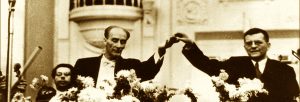 Evgeny Mravinsky — the iconic Russian conductor born to a family of Petrograd aristocrats — fared far better than most of his high-born peers during the Soviet era, rising to prominence as arguably that nation’s greatest maestro. Mravinsky was the preferred orchestral interpreter of composer Dmitri Shostakovich — until the two had an acrimonious falling out over Mravinsky’s refusal to conduct Shostakovich’s Thirteenth Symphony (“Babi Yar“), a work which included poems by dissident Soviet writer Evgeny Yevtushenko.
Evgeny Mravinsky — the iconic Russian conductor born to a family of Petrograd aristocrats — fared far better than most of his high-born peers during the Soviet era, rising to prominence as arguably that nation’s greatest maestro. Mravinsky was the preferred orchestral interpreter of composer Dmitri Shostakovich — until the two had an acrimonious falling out over Mravinsky’s refusal to conduct Shostakovich’s Thirteenth Symphony (“Babi Yar“), a work which included poems by dissident Soviet writer Evgeny Yevtushenko.
Mravinsky’s recorded legacy is fascinating for several reasons beyond the documentation of art music during the Soviet era. Mravinsky’s first sessions were committed to 78 sides in 1939, but he stopped making studio recordings in the early 1960s in a sort of “reverse Glenn Gould” decision; his legacy on record and CD is not unlike that of Sviatoslav Richter, who himself generally disliked the studio and rarely engaged in such sessions after the mid-1960s. Mravinsky’s post-studio discography, mostly with “his” Leningrad Philharmonic, is a legacy of consistently impactful performances that combine taut structural control with evocative and colorful spontaneity. Yet these same characteristics can be heard in his studio sessions which, judging from careful listening, were committed to tape in very long takes, yielding nothing in dramatic power to his live performances.
Several of Mravinsky’s recordings have (quite rightfully in this writer’s not-so-humble opinion) achieved cult status, including his studio recordings of Tchaikovsky’s Fourth, Fifth, and Sixth Symphonies for Deutsche Grammophon (recently reissued by Alto), his 1982 live recording of the Eighth Symphony of Dmitri Shostakovich, first issued on Philips (also reissued recently in an improved remastering by Alto), and a searing live performance from 1980 of Bruckner’s Ninth Symphony, originally issued by Melodiya.
One Mravinsky recording that has been a particular favorite of mine has proven elusive over the years. In many ways it is among Mravinsky’s most important recordings – that of Shostakovich’s Seventh Symphony, “Leningrad.”
The work, composed on a Bruckner-Mahler scale, depicts Leningrad (and the world) under siege by the Nazi Reich. It garnered notable broadcast performances during the war conducted by Samuil Samsoud, Arturo Toscanini, Karl Eliasberg, and Sir Henry Wood among others, and is arguably the most performed artistic “political statement” of World War II. Mravinsky made his sole recording of the work in studio with the Leningrad Philharmonic in 1953 — less than two years after William Steinberg’s recording of the Seventh with the Buffalo Symphony Orchestra on Musicraft, the work’s first commercially released recording.
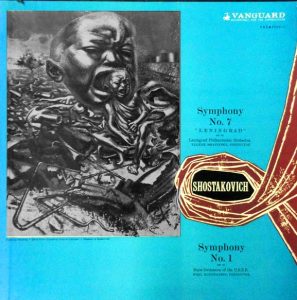 The release history of these Mravinsky sessions is confounding. It was first issued in the then-new LP format as a two-disc set in the Soviet Union on the Aprelevsky label — a precursor to Melodiya — in 1953. Four years later, it was issued for the first (and only) time on LP in the West by Vanguard Records (yes, that’s the original cover) — the result of a deal Seymour Solomon had made with Soviet authorities to release LPs by great Soviet artists of the period including Sviatoslav Richter, Mstislav Rostropovich, and David Oistrakh. At around the same time, Japanese licensee Shinsekai made the first of several limited-edition issues of the recording for the Asian market.
The release history of these Mravinsky sessions is confounding. It was first issued in the then-new LP format as a two-disc set in the Soviet Union on the Aprelevsky label — a precursor to Melodiya — in 1953. Four years later, it was issued for the first (and only) time on LP in the West by Vanguard Records (yes, that’s the original cover) — the result of a deal Seymour Solomon had made with Soviet authorities to release LPs by great Soviet artists of the period including Sviatoslav Richter, Mstislav Rostropovich, and David Oistrakh. At around the same time, Japanese licensee Shinsekai made the first of several limited-edition issues of the recording for the Asian market.
All of these LP releases were short-lived, with some remaining frustratingly elusive on the collector’s market.
During there CD era, Mravinsky’s “Leningrad” was briefly available two decades ago, for a short period, in CD format on Vanguard spin-off label Omega, Melodiya (via partnership with BMG), and an awful-sounding “pirate” Urania release.
All of the legitimate releases had audio issues, many to do with the quality of source material copies used for commercial release despite having been recorded to tape — which Soviet engineers had been using nearly half a decade before Western record labels (the Red Army had “liberated” Magnetophon tape recorders and a substantial library of broadcast tapes from Germany during the last months of World War II). While the audio is good for the era by Soviet standards, the overall quality was not state-of-the-art.
Just over a year ago, a fellow Mravinsky fan (who has requested and been granted anonymity) who shares my enthusiasm for this recording provided me with a copy in a “high definition” 24-bit transfer. The sound quality was a bit better than the various CD recordings I had heard, but sonic issues remained: overload during the loudest passages, conspicuous volume changes, intermittent pitch instability, an abundance of thunks. low-frequency noises, clicks, lighting and mains hum, and a couple of jaw-droopingly bad edits (including one that omitted half a beat of a transitional passage). All of these issues were abated or eliminated — with almost no use of broadband noise reduction save for a few segments lasting several seconds at most. My source for this recording enthusiastically endorsed releasing it commercially, and my colleagues at Entertainment One (who own the Vanguard Classics catalogue), Alto Distribution, Amped Distribution, and Musical Concepts are releasing this restored version.
Some of you may be asking why there is any reason for a recording that does not sound like something out of, say, the Mercury Living Presence catalogue to be issued in “HD” format. I can only reply by pointing out that the Berlin Philharmonic recently issued a 22-SACD collection of the legendary maestro Wilhelm Furtwängler’s wartime broadcast recordings with that orchestra in sensational and often revelatory (even though slightly sterilized) restored transfers.
Serious listeners want iconic recordings from the pre-stereo era in the best sound possible.
Preserving and restoring the legacy of recorded 20th century art music does not seem to be a priority among the major labels unless a mega-seller artist such as Heifetz or Toscanini is involved — and even then, there is often room for improvement. Independent labels and distributors with an understanding of both the importance of these significant aural documents along with the dynamics and economics of the market are proud to serve this small but intensely curious and loyal market. With the rapid technological advancement of the digital infrastructure and the growth in high-definition online sellers and lossless/HD streaming, we are just getting started.
 Evgeny Mravinsky’s recording of the Seventh Symphony of Dmitri Shostakovich is now available for HD download and streaming here, here, and here, It will be issued in CD format by Vanguard Classics during June. Accept no substitutes!
Evgeny Mravinsky’s recording of the Seventh Symphony of Dmitri Shostakovich is now available for HD download and streaming here, here, and here, It will be issued in CD format by Vanguard Classics during June. Accept no substitutes!



